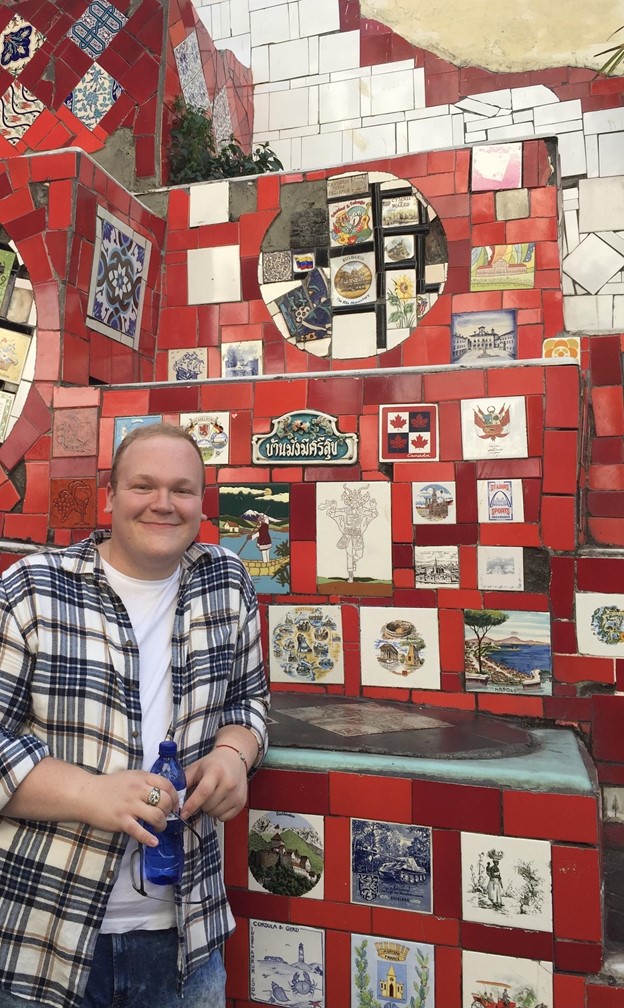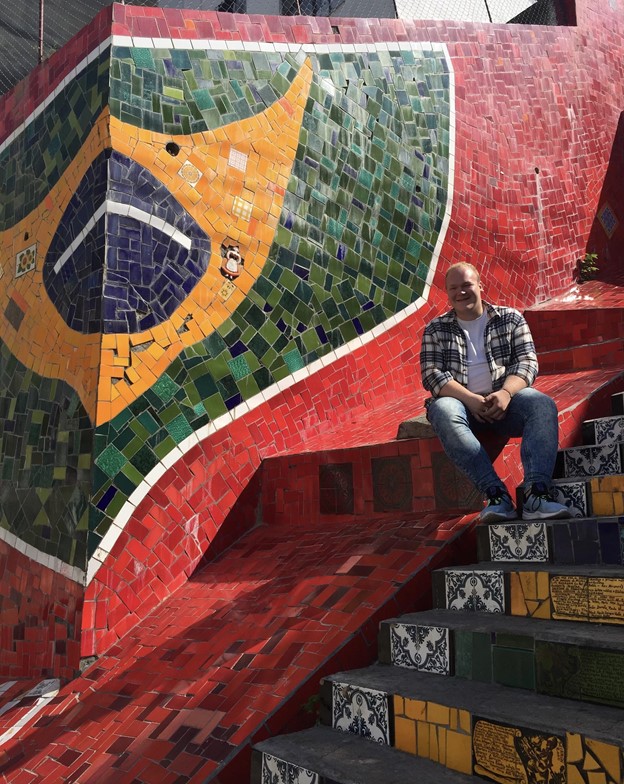Oi, Gente! Tudo bem? Hi everyone! How are you? My name is Brandon Penrod, and I am a 2021-2022 Gilman Alumni Ambassador. I studied abroad with the Gilman Scholarship in Florianópolis, Brazil, in the summer of 2019.

My journey with Gilman began in early 2019. I was set to graduate from Loyola University Chicago by the end of that summer. I had landed a role as a Peace Corps Youth Development Volunteer in Eswatini, departing in the fall. In my position, I would be using SiSwati and Portuguese language in my day-to-day activities, working with kids of all ages. I wanted to serve as the best volunteer I could, so I started to learn those languages as soon as I knew Peace Corps was my next adventure. However, I did not have adequate access to Portuguese or SiSwati language classes and resources. I consider myself a lifelong polyglot-in-training, particularly with critical languages, and I consistently seek opportunities to work on my language skills. From experience in Thailand, Turkey, and Italy, I know that experiential learning and an immersive environment are the best tools to learn and conquer a language. I decided to apply to study abroad one last time in my undergraduate studies in Brazil. I applied for the Gilman scholarship and the Critical Need Language Award (CNLA) to aid my journey. It was one of the best decisions I ever made.
Little did I know that I would fall head-over-heels in love with Portuguese during my three months in Brazil. My program provider paired students with “Brazilian Buddies.” I formed an incredible bond with my buddy, Kauê, who introduced me to other Brazilians, whom I consider some of my closest friends today. Early in my experience, I immersed myself in Brazilian culture and friendship, which was the key reason I learned Portuguese so efficiently and continued learning after I left Brazil. I also had an incredible Portuguese professor, Daniela, who ensured each class felt meaningful and fulfilling.
When I returned from Brazil, I found several ways to keep my connection to the Portuguese language alive. I’d like to share my advice, and it applies to anyone learning any other languages as well.
- Maintain the relationships you have made abroad and in your language learning journey. It may seem obvious, but it is critical. Reach out to your acquaintances and friends. Reach out to that professor. Give life updates and ask for theirs. Practice your skills with them in writing and over the phone if possible. Take a moment each week to send a message to someone who is a part of your journey. I promise they will love to hear from you and know that you continue to learn the language(s) that brought you together.
- Consider tutoring in your native language! There are numerous virtual and in-person platforms for language exchange. Not all of them are tutor-based. One of my side gigs during my post-grad life was tutoring English via Cambly. Because of my knowledge of Portuguese, I ended up mainly tutoring Brazilian, Portuguese, and Mozambican students. My Portuguese language skills improved while tutoring English since I often needed to explain concepts in Portuguese. Over the past two years, I have formed excellent language-based relationships with my students. I look forward to tutoring each week because my students and I often end up teaching each other!
- Take advantage of formal classes if possible! Though I am in graduate school now, and time is precious, I am dedicating one class per semester to the advanced study of Portuguese. Formal language classes are essential for many of us. For me, my Portuguese class is an outlet of expression outside of my typical classes. Whether you are enrolled in an academic program or not, various institutions and organizations offer virtual classes every semester.
- Continue pursuing other scholarship and fellowship opportunities to learn your language. The State Department offers several programs that focus on language learning as a significant component, such as CLS, Boren, and Fulbright. Don’t let opportunities for your advancement in a language slip away. Apply yourself and see what happens.
- Music. From a Neuroscience perspective, listening to music in your target language helps you learn and retain language information without realizing it (our brains are pretty powerful, aren’t they?). Listen to whatever makes you happy. In terms of Portuguese, my favorite genres are Tropicália from the 1960s and 1970s, Samba, and modern Funk. Every language has music to be appreciated; it’s up to you to find it.
Language learning is a never-ending journey. We even continue to learn our native languages throughout our lives. Whether you have forgotten some of your language skills, haven’t had time, or just haven’t felt motivated, remember that it’s never too late to put the effort in wherever you are in your journey. There is so much to explore. We are all capable despite the chaos of life.
Boa sorte em sua jornada linguística! Good luck on your language journey!




